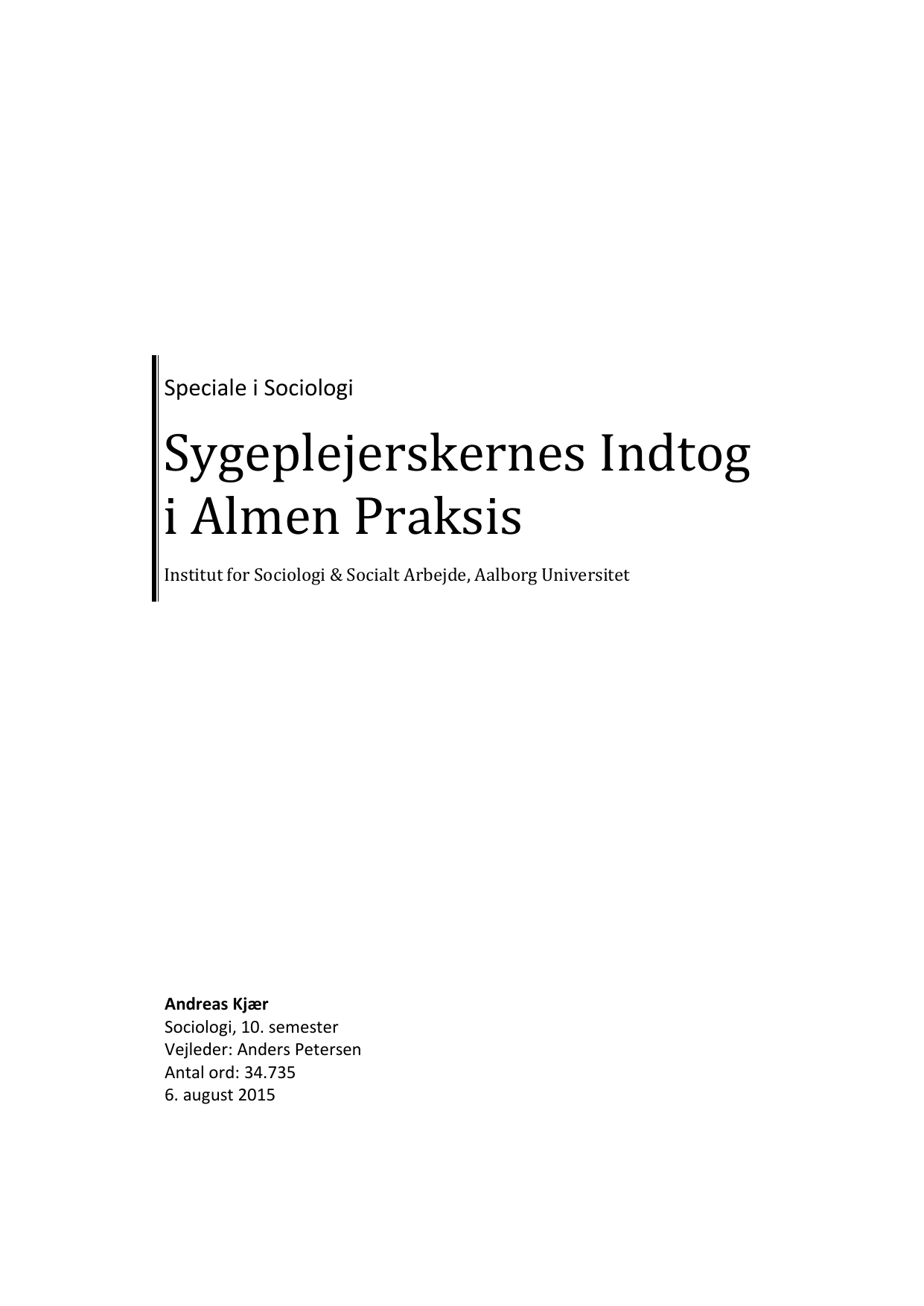
Sygeplejerskernes Indtog i Almen Praksis
Oversat titel
Nurses’ Increment in the Danish General Practice
Forfatter
Semester
4. semester
Uddannelse
Udgivelsesår
2015
Afleveret
2015-08-04
Antal sider
92
Abstract
Nurses’ increment in the Danish general practice is discussed in relation to general developments within the field. Several changes within the general health care system, demographics, patients’ attitude, technological advancement and general practitioners desire for new working conditions are identified as supportive factors. The actual distribution of tasks at the worksites and the procedures of doing so are emphasized. It is argued, that tasks calling for other approaches than strictly biomedicine – which always have been part of general practitioners’ repertoire – are expanding in a manner which threatens to render the general practitioners position. Nurses have proven themselves well suited to substitute and supplement the general practitioners with these tasks. The nurses’ ongoing increment in Danish general practices seems to be a solution to some the current challenges, but introduces new challenges as well. I discuss how the movement represents a contestation of the traditional way of organizing general practice through profession. Instead it reflects the concept of ‘treatment teams’ gaining ground, where the commensurate competence is encoded in the structures of the local organization rather than solely in the hands of individual professionals. Nurses are embedded into this local structure by continual on-the-job training and access to supervision from general practitioners. The teamwork enables the nurses to substitute and supplement certain tasks and in turn enabling the general practitioners to exercise their expertise more consistently. In this way, it is argued that the local organization becomes guarantor of both professions professional work. The thesis is structured by a comprehensive document review and a field study in a clinic with extensive nurse-participation. It is analyzed hermeneutic through the lens of Andrew Abbott’s theory: The system of professions.
Nurses’ increment in the Danish general practice is discussed in relation to general developments within the field. Several changes within the general health care system, demographics, patients’ attitude, technological advancement and general practitioners desire for new working conditions are identified as supportive factors. The actual distribution of tasks at the worksites and the procedures of doing so are emphasized. It is argued, that tasks calling for other approaches than strictly biomedicine – which always have been part of general practitioners’ repertoire – are expanding in a manner which threatens to render the general practitioners position. Nurses have proven themselves well suited to substitute and supplement the general practitioners with these tasks. The nurses’ ongoing increment in Danish general practices seems to be a solution to some the current challenges, but introduces new challenges as well. I discuss how the movement represents a contestation of the traditional way of organizing general practice through profession. Instead it reflects the concept of ‘treatment teams’ gaining ground, where the commensurate competence is encoded in the structures of the local organization rather than solely in the hands of individual professionals. Nurses are embedded into this local structure by continual on-the-job training and access to supervision from general practitioners. The teamwork enables the nurses to substitute and supplement certain tasks and in turn enabling the general practitioners to exercise their expertise more consistently. In this way, it is argued that the local organization becomes guarantor of both professions professional work. The thesis is structured by a comprehensive document review and a field study in a clinic with extensive nurse-participation. It is analyzed hermeneutic through the lens of Andrew Abbott’s theory: The system of professions.
Emneord
Almen praksis ; Sygeplejersker ; Konsultationssygeplejersker ; praksispersonale ; opgaveglidning ; uddelegering ; uddelegere ; behandlerteam ; lægekonflikt ; familielæge ; samarbejde ; Lægeklinik ; praktiserende læge ; udvikling ; lægemangel ; substitution ; professionssociologi ; Andrew Abbott ; profession
